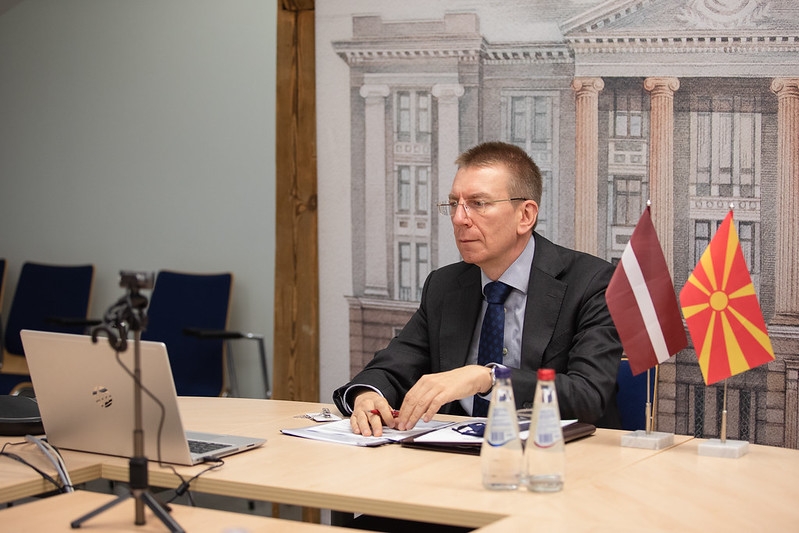On 15 October 2020, the Latvian Minister of Foreign Affairs, Edgars Rinkēvičs, and the Minister of Foreign Affairs of North Macedonia, Bujar Osmani, had an online meeting. Their conversation covered bilateral relations between the two countries, as well as the issues of North Macedonia’s integration with the European Union and current developments in EU enlargement to the countries of the Western Balkans.
Edgars Rinkēvičs congratulated the North Macedonian Foreign Minister Bujar Osmani on taking office, noted the good relations between Latvia and North Macedonia and expressed readiness to further promote the political dialogue and all types of cooperation. Latvia is open to offering its expertise and EU integration experience to North Macedonia, Edgars Rinkēvičs pointed out. Latvia is already involved, he said, in experience sharing projects in educating young North Macedonian professionals in European law and economy.
The Ministers agreed on the need to intensify business relations. The Latvian Foreign Minister underlined in particular the opportunities for cooperation in digital economy and sectors with high value-added. Edgars Rinkēvičs invited the North Macedonian Foreign Minister, Bujar Osmani, to visit Latvia with a business delegation, epidemiological situation permitting.
The officials then discussed EU enlargement matters in light of the 2020 Communication from the European Commission on EU enlargement policy published on 6 October and containing the assessment of reform progress in the countries and the Economic and Investment plan for the Western Balkans, as well as the preparation of negotiating frameworks for EU accession of Albania and North Macedonia.
Edgars Rinkēvičs expressed support for EU perspective for the Western Balkans based on an individualised approach and fulfilment of criteria. An EU perspective for the Western Balkans fosters positive change in the region, motivates the countries to carry out reforms, pursue good neighbourly relations, build regional contacts and cultivate cooperation across Europe, which is a general course towards peace, stability and prosperity, Edgars Rinkēvičs noted.
The Minister welcomed the Council’s decision of March 2020 on opening accession negotiations with Albania and North Macedonia, which is strong and credible evidence of an EU perspective not only for those two countries but also for the Western Balkans region as a whole. The Minister also noted that it was vital to move ahead with the EU integration process of North Macedonia by holding an Intergovernmental Conference as soon as possible, which would enable the deepening of reforms related to EU integration.





